You are on CGS' Legacy Site.
Thank you for visiting CGS! You are currently using CGS' legacy site, which is no longer supported. For up-to-date information, including publications purchasing and meeting information, please visit cgsnet.org.
Landing Page
Project Will Deepen Knowledge of Career Transitions Across All Broad Fields of Study
PRESS RELEASE
FOR IMMEDIATE RELEASE:
Contact: Katherine Hazelrigg (202) 461.3888/ khazelrigg@cgs.nche.edu
Washington, DC — The Council of Graduate Schools (CGS) has announced a new phase in its efforts to understand and support diverse PhD career pathways. A significant grant from the National Science Foundation (NSF #2000750) will allow CGS to examine factors likely to impact retention and persistence in Science, Technology, Engineering and Mathematics (STEM) careers, particularly for underrepresented students. Meanwhile, a previously-announced grant from The Andrew W. Mellon Foundation will seek to uncover both challenges and decision-making factors at points of career transition for Humanities PhDs.
“The new grants from NSF and Mellon will give us the opportunity to delve deeper into experiences of students and alumni in STEM and Humanities fields,” said CGS President Suzanne T. Ortega. “Our broader goal is to allow member universities to use data about PhD careers with greater nuance and awareness of challenges that students and alumni face at critical points of transition—in particular, from graduate school to career and in the years immediately following graduation. In 2021, we will launch a research hub for doctoral institutions as they seek to better understand and use PhD career data to improve programs.”
These projects build upon three earlier phases of CGS research: a feasibility study supported by the Alfred P. Sloan Foundation and The Andrew W. Mellon Foundation; a survey development phase supported by the Mellon, Sloan, and National Science Foundations (NSF #1534620); and a survey implementation phase supported by the Mellon Foundation and NSF (#1661272). In the most recent phase, CGS developed a network of 75 U.S. doctoral institutions through a competitive award process to collect data from STEM PhD students and alumni about their professional aspirations, career pathways, and career preparation.
Ortega believes the NSF-funded project will assist universities and scientific agencies in deploying investments and strategies that more effectively support STEM career trajectories. “Better understanding PhD career pathways has been a CGS research priority for nearly a decade, and this project takes the next step from understanding aspirations and experiences to bolstering career success. This work also has the potential to help funders and institutions refine their strategies for supporting graduate students and alumni pursuing careers in STEM fields.”
The Humanities Coalition, the new Mellon-funded effort, will further enhance the graduate education community’s understanding of humanities PhDs and their careers and to refine humanities-specific strategies for curricular change and program improvement. Additional research to better understand the nature of early career transitions for humanists is a primary component of the new initiative. CGS recently announced sub-awards for five institutions (Iowa State University, Purdue University, The University of Southern Mississippi, The University of Texas at El Paso, and University of Rochester) to join the data collection efforts. Additional sub-awardees will be identified in 2021 to support projects designed to develop and assess initiatives for better supporting humanities PhD students transitioning from graduate school.
About CGS
The Council of Graduate Schools (CGS) is an organization of approximately 500 institutions of higher education in the United States and Canada engaged in graduate education, research, and the preparation of candidates for advanced degrees. The organization’s mission is to improve and advance graduate education, which it accomplishes through advocacy in the federal policy arena, research, and the development and dissemination of best practices.
The COVID-19 pandemic presents new obstacles to the matriculation, persistence and completion of U.S. graduate students, with those who are first-generation, low-income, racially and ethnically underrepresented (URM) at greatest risk for educational disruptions. With funding from the National Science Foundation’s (NSF #2037360) Rapid Response Research (RAPID) program, CGS will collaborate with the Council for Opportunity in Education (COE) and the Council of Historically Black Graduate Schools (CHBGS) to understand challenges currently faced by URM and first-generation students and to provide just-in-time information that will help support their success.
The new project, Investigating Challenges to Matriculation and Completion for Underrepresented STEM Graduate Students during the COVID-19 Pandemic, will focus on four specific areas of research: obstacles to matriculation, obstacles to retention, challenges to sustaining graduate school aspirations for rising college seniors, and strategies for graduate school success. The findings will inform graduate student advising and support structures and guide interventions to broaden URM student participation in STEM graduate education.
Press Release: CGS Takes Action to Protect Pathways to Graduate Schools for Underrepresented Graduate Students during COVID-19
Contact
.png)


STATEMENT FROM THE CGS PRESIDENT AND BOARD OF DIRECTORS
Dear Colleagues,
Recent days and weeks have brought us heart-wrenching reminders of race-based inequality and injustice. In addition to COVID-19’s disproportionate impact on students of color and their families, we have witnessed appalling acts of racism and violence toward African Americans—most recently George Floyd, Breonna Taylor, Ahmaud Arbery, and Tony McDade—acts that cause further distress and fear among communities already suffering.
The CGS Board of Directors condemns both the deeply embedded and structural forms of racism and injustice we see around us as well as their most immediate manifestations. We also stand in solidarity with people of color in our community as they confront painful examples of violence and injustice.
We also acknowledge that words are not enough. As an organization, we affirm our commitment to fostering diversity and inclusion at all levels of graduate education. We will continue working with our members to make programs more diverse and accessible, to promote diversity as a principle that supports the learning of all students, to deepen our understanding of inclusive mentoring practices, and to provide inclusive and accessible student support services.
Of equal importance, we commit to helping our students develop the conceptual frameworks and analytic methods necessary to understand social and economic forms of injustice, in all their manifestations. We also commit to helping them develop the leadership skills necessary to begin building a better, more just society. To paraphrase Mahatma Gandhi, we must create graduate programs and institutional cultures that prepare students to be the change this world so desperately needs.
If you have suggestions for how CGS can better support this work, please contact president@cgs.nche.edu.
In solidarity with you, your staff, and your students,
Suzanne T. Ortega
President
Council of Graduate Schools
Sally Pratt
Chair, CGS Board of Directors (2020)
Vice Provost for Graduate Programs University of Southern California
on behalf of the CGS Board of Directors
JUNE 3, 2020 | CGS Research-in-Brief
The Council of Graduate Schools (CGS) fielded the Survey on the Impact of the Coronavirus Disease 2019 (COVID-19) Pandemic on Graduate Education to its member institutions. The survey was electronically disseminated to 456 CGS Regular Member institutions based in the United States and Canada between May 4 and 11, 2020. A total of 201 responses, or the response rate of 44%, was recorded. Public institutions, as well as Doctoral Universities-Very High Research Activity (R1) institutions, were overrepresented among the respondents. The below brief summarizes the aggregated, unweighted findings from the survey. The full frequency tables, including the questionnaire items and descriptive characteristics of responding institutions, can be found in the appendix.
Immediate Plans & Decisions Made to Date
- Roughly three out of four graduate deans (76%) noted that their institutions had formed a campus task force or committee of stakeholders addressing the ongoing impact of the COVID-19 pandemic on graduate education.
- Of the respondents, 64% of graduate deans reported that their institutions had adopted holistic approaches to graduate admissions before the pandemic or have since instructed individual graduate programs to adopt holistic approaches in future graduate admissions decisions. A little over one out of five (22%) reported that their institutions have not decided on how the pass/fail or similar grade schemes for Spring 2020 will be factored into the graduate admission processes, however.
Check out the CGS statement on graduate admissions during the COVID-19 pandemic.
- The majority of graduate deans reported that they do not anticipate changes to current policies (18%) or are granting extensions on a case-by-case basis (47%). Fewer institutions (14%) indicated that their institutions have either granted an automatic extension or are granting extensions on a case-by-case basis.
- The pandemic has also affected some of the key summer activities for graduate schools. Of the graduate deans who responded and were aware of such decisions, 87% reported that dissertation camps or other place-based writing retreats for graduate students this summer had been modified to an alternative format. 21% noted that summer bridge and other placed-based outreach programs for URM and master’s students had been modified. Also, nearly two-thirds (66%) reported that they had modified the delivery mode of fall orientation.
Has your institution transitioned dissertation camps or other place-based writing retreats for graduate students to a virtual format? Share with you colleagues how you have done it!
Check out the CGS webinar, Moving to a Virtual Space: How to Create Virtual Graduate Student Orientations.
How are you planning for virtual new student orientations? What will you be doing over the summer to stay in touch with incoming graduate students? Share with your colleagues what you are planning!
- Many graduate deans (87%) reported that their institutions have or anticipate budget shortfalls due to the COVID-19 pandemic. However, the vast majority of them also noted that their institutions are committed to honoring all accepted financial support offers made to incoming graduate students (67%) and all financial support for commitments made to current/returning students (74%). Although relatively few, there are some institutions that have rescinded or given individual program discretions to rescind graduate student financial support to meet the budgetary shortfalls for both incoming (5%) and current/returning students (7%).
- At the time of the survey, a number of graduate deans reported that either their institutions had not distributed any direct student aid through the CARES Act or do not know if aid was made available to graduate students.
Keep yourself apprised of federal policy updates related to the COVID-19 pandemic, as well as sign up to receive our weekly Washington Insights & Highlights.
Outlook for AY2020/21 and Priorities
- Graduate deans responding to the survey reported a range of anticipated enrollment levels for Fall 2020. Still, they expect a modest decline in the overall enrollment, as well as in enrollment of domestic, underrepresented minorities. Graduate deans reported a more pessimistic outlook for international graduate enrollment in Fall 2020.
- Looking toward Academic Year 2020/2021, graduate deans responding to the survey are more optimistic about their institution’s ability to provide training, support, or resources for stakeholders of graduate education to navigate the crisis. For example, graduate deans are somewhat/moderately confident about providing adequate training for graduate teaching assistant teaching online (Average=3.51 out of 5), graduate faculty teaching and mentoring graduate students virtually (Average=3.47/5), and supporting administrators and departmental staff members to help graduate students (Average=3.37/5).
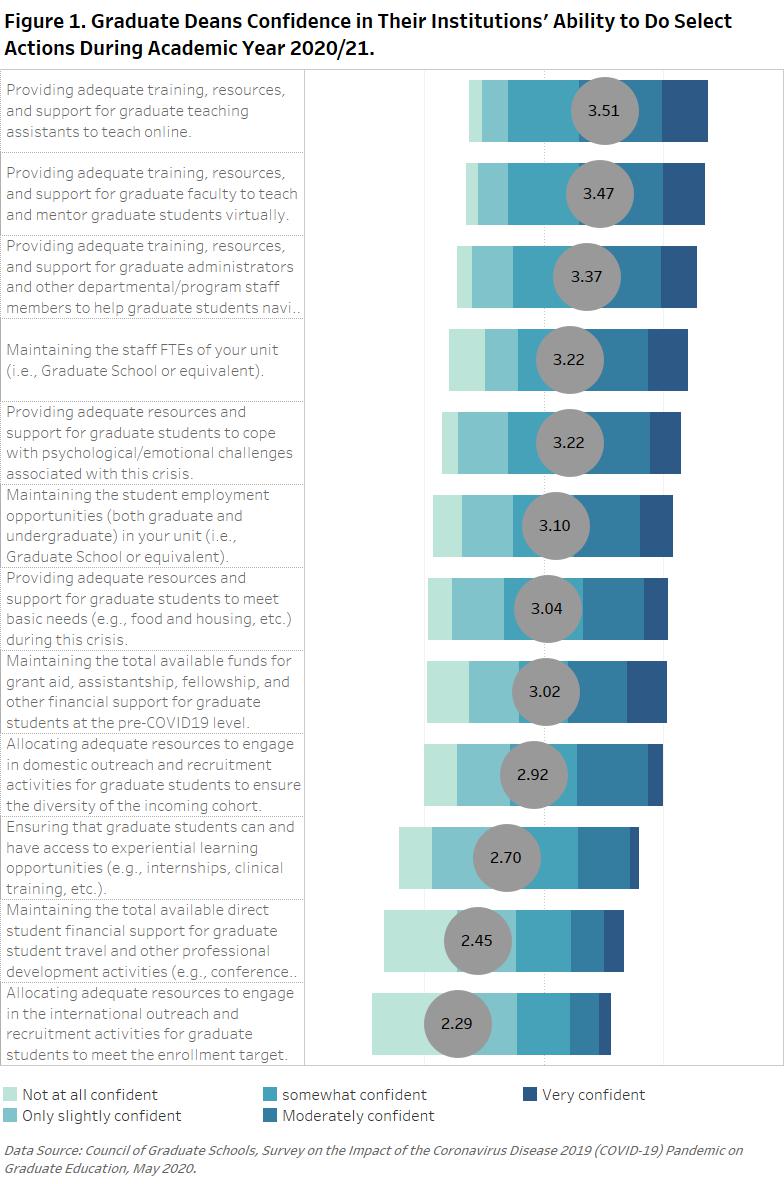
- However, graduate deans in the survey were less confident about their institution’s ability to allocate adequate resources to engage in international outreach or recruitment activities (Average=2.29/5) or maintain the level of available financial support for graduate student travel and other professional development activities (Average=2.45/5). They were also less confident that their institutions can ensure graduate students having access to experiential learning opportunities, such as internships and clinical training (Average=2.70/5).
Be sure to register for the upcoming virtual Summer Workshop, learn from experts and your peers about how to navigate some of the challenges, such as supporting international graduate students, offering career development opportunities and experiential learning opportunities for graduate students during the pandemic.
- Finally, graduate deans in the survey identified protecting funds for grant aid, assistantships, fellowships, and other financial support for graduate students as the top priority in the wake of the pandemic and its impact on the institution’s budget. This was followed by protecting resources for supporting graduate students' basic needs during the crisis and offering graduate students support for coping with psychological challenges associated with this crisis.
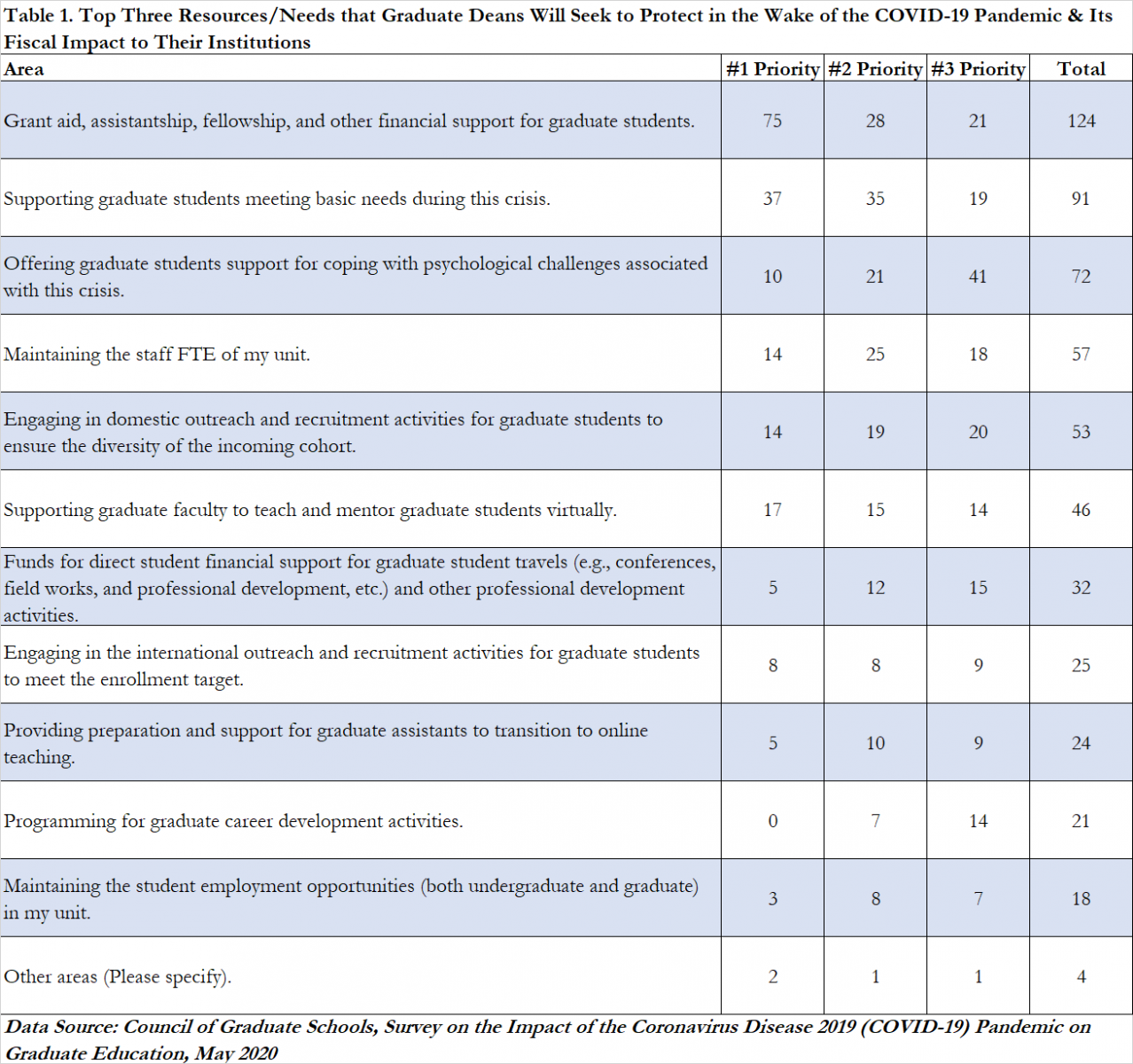
- Although graduate deans were not as confident in their institution’s ability to do so, few of them identified engaging international outreach and recruitment activities or maintaining funds for graduate student travels and other professional development activities as a high priority area for protecting resources.
CGS also offers various platforms for member institutions to learn from each other as we navigate the pandemic together, and we encourage you to bookmark our COVID-19 resource page as a one-stop shop. The page features various U.S. government guidance, as well as resources page put together by some of the CGS member institutions. You can also directly engage other CGS members via the Dean’s Discussion Board, where you can ask questions to your peers and also to weigh in on questions from others.
Author Contribution and Acknowledgment
The brief was prepared by Hironao Okahana. CGS President Suzanne T. Ortega, the Leadership Team, Research Team, and Research and Information Services Committee provided feedback to the data collection instrument, as well as on the write-up. Enyu Zhou and Janet Gao contributed to the preparation of the annotated questionnaire document.
###
“Hispanic Serving Institutions: A Critical Pipeline to Graduate School for Latinx Students” is an information brief and interactive toolkit designed to help close the gap in graduate degree attainment for Latinx students. The project was led by JoAnn Canales, CGS’s Dean-In-Residence from 2018 through 2019. Dr. Canales’ work underscores how the graduate enrollment and degree attainment of Latinx students continues to lag behind those of other groups. The project identified Hispanic Serving Institutions (HSI) - defined as accredited, degree-granting public or private non-profit institutions of higher education with at least 25% full-time equivalent undergraduate students who identify as Hispanic - as a possible vanguard to lead the higher education community as they address this disparity.
The brief is accompanied by a set of checklists looking at how Latinx students can be more successfully recruited, retained, and supported during various phases of the graduate student lifecycle. These checklists are not only designed as a complimentary framework to the brief, but also to provide administrators with a tool to help assess and implement the resources needed to improve Latinx student outcomes.
Additional CGS Resources
Doctoral Initiative on Minority Attrition and Completion
Innovation in Graduate Admissions Through Holistic Review
The Global Postgraduate Diversity Resource - A CGS-ETS Joint Initiative
Graduate Enrollment and Degrees, 2008-2018
Contact
CGS is providing information, networks, and a resource hub for member institutions as they work to support their students throughout the COVID-19 pandemic. A list of CGS resources for navigating the pandemic can be seen below. New resources and opportunities to connect with your colleagues and CGS leadership will be added, so check this page frequently.
- The Graduate Community’s Response to COVID-19: A Conversation with Graduate Deans
- President Suzanne Ortega’s Office Hours
- Dean’s Discussion Board
- April 15 Resolution
Institutional Initiatives and Examples
CGS members have responded to the COVID-19 by creating new resources and initiatives to support graduate students. Click here for a list of CGS member initiatives and examples submitted by the graduate education community.
Federal Regulatory and Legislative Updates for Institutional Operations
The linked page includes resources and summaries on federal legislative and regulatory actions related to COVID-19 as well as CGS-supported requests to Congress and the Administration.
- Department of Education page on COVID-19
- UPDATED Guidance for interruptions of study related to Coronavirus (COVID-19) (May 15, 2020) provides information that expands on the Department's March 5, 2020 and April 3, 2020 guidance.
- UPDATED Additional Learning Information: Department’s final rules for Distance Learning and Innovation.
- Office for Civil Rights posts Questions and Answers for Postsecondary Institutions Regarding the COVID-19 National Emergency including technical assistance for postsecondary institutions in meeting Federal civil rights laws.
- UPDATED Department of Education publishes third FAQ guidance on the CARES Act Higher Education Emergency Relief Fund
- Office of Postsecondary Education publishes revised public reporting requirements for Higher Education Emergency Financial Aid Grants to Students.
- Centers for Disease Control and Prevention provides updated guidance and communication resources for Colleges and Universities to Plan, Prepare, and Respond to the coronavirus disease.
- UPDATED Centers of Disease Control and Prevention guidance on Testing, Screening, and Outbreak Response for Institutions of Higher Education
- White House Office of Management and Budget issued a memo allowing federal funding agencies, including NIH, to provide continued flexibilities to research grant recipients impacted by COVID-19. The flexibilities allow grant money to cover operational and salary costs.
- White House issues precautions for all individuals, including those on college campuses.
International Students
International graduate students are among those most affected by the COVID-19 pandemic. From issues with standardized testing to visas, the situation for international graduate students is continually evolving. Below is a list of resources to support international students as they navigate these challenging times:
- NAFSA covers who is and is not affected by the Trump Administration's April 22, 2020 proclamation limiting certain immigrants from entering the United States during the designated 60 day period. The original White House proclamation can be found here
- NAFSA maintains a hub of news and information on education abroad, international students and scholars, and regulatory information.
- Educational Testing Service (click here for GRE and here for TOEFL), Cambridge English, IELTS maintain web pages with updates to information for international English and GRE test takers.
- Department of Homeland Security provides FAQs for SEVP Stakeholders about the effects of COVID-19 and any additional SEVP adaptations in response to the pandemic for SEVP-certified schools and F and M students.
- USCIS updated Public Charge information to encourage all individuals, including immigrants seeking green card status, with symptoms that resemble COVID-19 to seek necessary medical treatment or preventive services. Such treatment or services will not negatively affect one’s future Public Charge analysis.
- Congressional Research Service published a report, Recovery Rebates and Unemployment Compensation under the CARES Act: Immigration-Related Eligibility Criteria
- U.S. Citizens and Immigration Services (USCIS) Response to Coronavirus (COVID-19)
Financial Aid
Graduate student financial support remains a top priority for CGS and its members. Below is a list of resources on graduate student financial aid.
- IRS published FAQs: Higher Education Emergency Relief Fund and Emergency Financial Aid Grants under the CARES Act covering how higher education institutions are to use Education Department funds to support students and institutions with expenses and financial needs related to the coronavirus pandemic.
- Century Foundation outlines how students can leverage the CARES Act Pandemic Unemployment Assistance through the Department of Labor summarizing how PUA differs from the traditional unemployment assistance program, what benefits are available, and which students qualify.
- Department of Education’s Office of Postsecondary Education clarifies Higher Education Emergency Relief Fund Reporting- Emergency Financial Aid Grants to Students, the information institutions must report on their use of HEERF grants as mandated in the CARES Act.
- UPDATED Department of Education’s Office of Federal Student Aid provides updated Coronavirus and Forbearance Info for Students, Borrowers, and Parents including Q&A on student loan payments, loan increases, distance learning, and agency and federal government responses.
- Department of Education’s Office of Postsecondary Education clarifies Higher Education Emergency Relief Fund Reporting- Emergency Financial Aid Grants to Students, the information institutions must report on their use of HEERF grants as mandated in the CARES Act.
- Department of Education guidance on the CARES Act: Higher Education Emergency Relief Fund. Federal Register posted the interim final rule on 6/17/20. Comments close 7/17/20.
- COVID-19 Title IV Frequently Asked Questions
- Frequently Asked Questions about the Institutional Portion of the Higher Education Emergency Relief Fund
- Frequently Asked Questions about the Emergency Financial Aid Grants to Students
- Department of Labor posted a press release on the Pandemic Unemployment Assistance program.
- National Association of Student Financial Aid Administrators (NASFAA) maintains information related to COVID-19 on their Today’s News page.
- Department of Education reopens the application period for institutions to apply for aid through the Higher Education Emergency Relief Fund (HEERF) through September 30.
- Department of Labor published a news release answering questions about eligibility for paid leave and Pandemic Unemployment Assistance.
Funding Opportunities
Research opportunities are of key importance to CGS and its members. Compiled below are resources on grant funding for federal and COVID-19 related research grants.
- National Institutes of Health provides information for NIH Applicants and Recipients of NIH Funding.
- National Endowment of the Humanities awards $40.3 million in new CARES Act grants to support operations and preserve jobs at museums, archives, historic sites, and colleges and universities across the U.S. A complete list of all 317 new NEH CARES grants is available here.
- A coalition of arts grantmakers launched Artist Relief, unrestricted grants to help artists in need of financial support due to COVID-19.
- National Science Foundation is accepting proposals to conduct non-medical, non-clinical-care research that can be used to understand the spread of COVID-19.
- National Endowment for the Humanities announced new grant guidelines designed to rapidly distribute CARES Act funding to cultural nonprofits affected by the coronavirus pandemic.
- National Science Foundation announced the Impact on Existing Deadline Dates and extends deadline dates for the solicitations or Dear Colleague Letters (DCLs).
- Institute of Museum and Library Services announced New Stimulus Funding for Communities Across America to award the first $30 million of $50 million appropriated to the agency in the CARES Act. The grants will be distributed to all 50 states, the District of Columbia, the U.S. territories, and the Freely Associated States based on population.
- Council on Governmental Relations created FAQs and Resources on COVID-19's Impact to Federal Awards and continues to update a host of resources.
- Department of Education announces Formula Grants to Outlying Areas from the Education Stabilization Fund through the CARES Act for use in response to coronavirus. Outlying Areas of the United States refers to the US Virgin Islands (VI), Guam (GU), the Commonwealth of the Northern Mariana Islands (CNMI), and American Samoa (AS).
State-level Information and Resources
- National Conference of State Legislatures: NCSL Coronavirus (COVID-19) Resources for States, including education.
Tax
- NACUBO offers COVID-19 Employer and Tax Resources summarizing tax credits and deferral programs, SBA low-interest loans for small employers including Payroll Protection Program (PPP) loans, and other tax relief including options for international students.
This page is designed to provide information on COVID-19 that may be relevant to your graduate programs and students. As this public health situation evolves, CGS may begin adding links to CGS member resources and communications.
April 15 Statement
Federal Agency Guidance (please note these are subject to updates/changes)
Centers for Disease Control and Prevention (CDC):
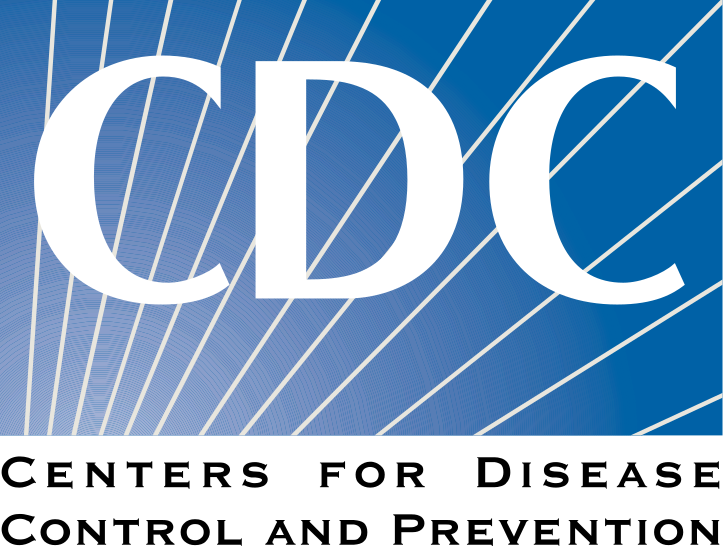
Interim Guidance for Administrators of US Institutions of Higher Education
Department of Homeland Security:
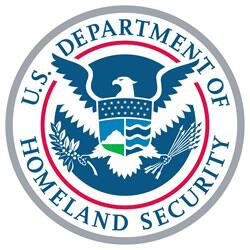
COVID-19: Guidance for SEVP Stakeholders
USCIS Temporarily Suspends Routine In-Person Services
Department of Education:
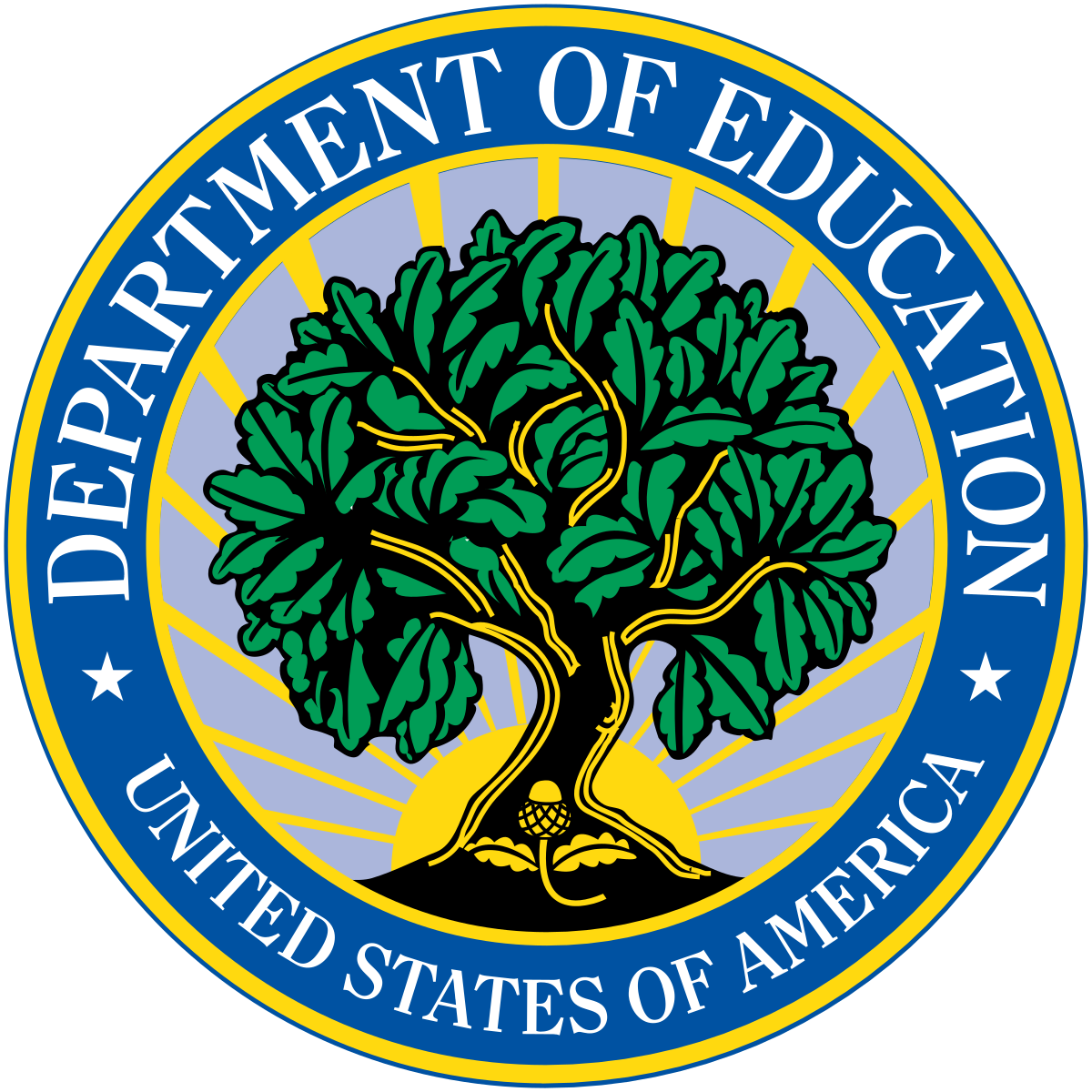
COVID-19 ("Coronavirus") Information and Resources for Schools and School Personnel
National Science Foundation:
.png)
Interim Guidance for Travel, Merit Review Panels, and NSF-Sponsored Meetings
RAPID Research on Coronavirus (COVID-19)
NSF Supporting Research to Address Coronavirus Disease blog
National Institutes of Health:
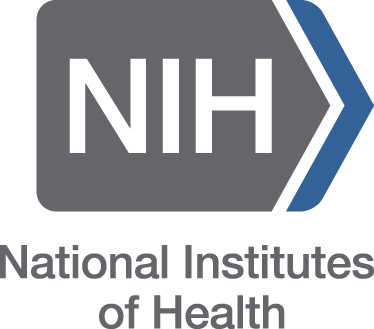
University Responses
- APLU offers general guidance as well as a list of responses from its member institutions to the virus.
Additional Resources on International Issues
- NAFSA maintains a hub of news and information on education abroad, international students and scholars, and regulatory information.
- Educational Testing Service (click here for GRE and here for TOEFL), Cambridge English, IELTS maintain web pages with updates to information for international English and GRE test takers.
Additional Resources on Student Financial Aid Issues
- National Association of Student Financial Aid Administrators (NASFAA) maintains information related to COVID-19 on their Today’s News page.
CGS COVID-19 Legislative and Regulatory Updates
This resource hub includes resources on federal legislative and regulatory actions related to COVID-19, in addition to highlighting letters CGS has signed requesting specific actions to Congress and the Administration.
- Summary of higher education and research provisions in the CARES Act
- Table of individual legislative proposals to address COVID-19
To submit a resource for consideration, please email Matthew Linton.
FOR IMMEDIATE RELEASE
Contact: Katherine Hazelrigg (202) 461-3888 / khazelrigg@cgs.nche.edu
While overall rates are up, some universities continue to see declines
Washington, DC —The Council of Graduate Schools (CGS) has published new data showing that international graduate application and first-time enrollment rates have increased at U.S. universities for the first time since Fall 2016. For Fall 2019, the final application counts from prospective international students increased by 3%, and the first-time enrollment of international graduate students increased by 4%. The proportion of first-time international graduate enrollment in master’s and certificate programs (75%) vs. doctoral programs (25%) has remained roughly the same.
The growth is driven primarily by increases in applications (3%) and first-time enrollment (4%) to master’s and certificate programs. While the overall increases are welcome news, some institutions did not see more student interest. For Doctoral Universities with Highest Research Activity (R1) and Master’s Colleges and Universities and Other Institutions (M1-3), applications and first-time enrollment increased across the board. However, for Doctoral Universities with Higher or Moderate Research Activity (R2 & R3), first-time enrollment declined in doctoral programs (-6%) and stagnated in master’s and certificate programs (-1%).
“We are pleased to see that the overall application and first-time enrollment numbers for international graduate students are on the rise. Our member universities work hard to ensure a welcoming environment for students and scholars from across the globe,” said CGS President Suzanne Ortega. “We remain vigilant, however, in monitoring obstacles, including the latest Executive Order “travel ban” and other changes in immigration and visa policy, that may negatively impact our ability to attract talented students from around the world.”
Highlights by Country of Origin
China and India continue to represent the largest shares of international graduate applications, first-time international graduate enrollments, and total international graduate enrollments. Between Fall 2018 and Fall 2019, the number of graduate applications and first-time graduate enrollments for Chinese nationals increased by 3%.
This is the second consecutive year of strong growth in graduate applications (11%) and first-time enrollments (22%) from sub-Saharan African students to U.S. graduate schools. While after two years of decline, applications (4%) and first-time enrollments (10%) from Mexican nationals rose.
Highlights by Field of Study
Across broad fields of study, international graduate applications increased in arts and humanities (6%), health sciences (7%), mathematics and computer sciences (7%), and biological and agricultural sciences (14%) between Fall 2018 and Fall 2019. By contrast, applications in engineering (-2%) and business (-3%), two of the largest broad fields of study, decreased. The largest one-year increases in first-time international graduate enrollment by broad field of study were in mathematics and computer sciences (11%), social and behavioral sciences (11%), and biological and agricultural sciences (10%).
About the survey and report
Conducted since 2004, the CGS International Graduate Admissions Survey tracks the applications and enrollments of international students seeking U.S. master’s and doctoral degrees. As the only report of its kind to offer data on the current academic year, International Graduate Applications and Enrollment: Fall 2019 reports applications, admissions, and enrollments of international master’s, certificate, and doctoral students at U.S. colleges and universities. In Fall 2016 the survey was redesigned to collect data by degree objective (master’s and graduate certificate vs. doctorate), and for all seven regions of origin, eight countries of origin, and all eleven broad fields of study, yielding the only degree-level data currently available for graduate admissions and enrollments. 403 U.S. graduate institutions who are members of CGS or its regional affiliates responded to the 2019 survey.
###
The Council of Graduate Schools (CGS) is an organization of approximately 500 institutions of higher education in the United States and Canada engaged in graduate education, research, and the preparation of candidates for advanced degrees. The organization’s mission is to improve and advance graduate education, which it accomplishes through advocacy in the federal policy arena, research, and the development and dissemination of best practices.
Many CGS member institutions are responding to events surrounding the recent Coronavirus outbreak, which may impact both international students coming to the U.S. as well as domestic students studying abroad. CGS members can find regularly updated information about the virus and travel precautions from the Centers for Disease Control and Prevention and the Department of State. CGS members are also encouraged to engage in dialogue with other members on CGS’s Dean’s Discussion Board on this topic, where members can share what their campuses are doing to address challenges related to restricted travel and administering entrance exams, for example.
The Council of Graduate Schools (CGS), an association of nearly 500 universities that grant graduate
degrees, recognizes that diversity, equity, access, and inclusion are critical to the excellence of graduate
education.
Supporting diversity and inclusion in graduate education is both an economic and a moral imperative.
For a nation to prosper, drive innovation, ensure sustainability and maximize impact, its universities
must draw from a broad pool of students with the ability, curiosity, and motivation to complete a
graduate degree. In the United States, as in many countries, the progress we are making toward this
goal is steady, but slow. In order to accelerate progress, universities, funding bodies, and policymakers
must work together to develop policies and practices that help attract, retain, and support the success
of all students, and especially those from populations historically underrepresented in graduate
education.
As we pursue this goal, it is important to recognize that opportunities to learn and work in diverse
environments are essential to the preparation of all students. As countries and economies become
increasingly connected, it is imperative that all students have an equitable opportunity to think,
communicate, and collaborate both locally and globally. Given the compelling evidence that diverse
teams produce better innovations and results,1 diverse communities will be best positioned to solve
problems of local and global scope.
Excellence depends on not only access, but the creation of communities that are inclusive – valuing
difference and promoting a sense of belonging. Toward this end, graduate schools and graduate
programs must clearly state their commitments to advancing diversity, equity, access, and inclusion,
making it clear that these values support the achievement and engagement of all students. Graduate
programs, graduate schools, and the universities of which they are a part must closely examine evidence
of what is measured, valued, and rewarded. Along with funders of graduate education, they must also
invest time and resources in better understanding the policies and practices that favor diversity and
inclusion.
By upholding these four broad principles—diversity, equity, access, and inclusion—all graduate
students, as well as their programs, communities, and nations stand to benefit.
1. Page, Scott. (2007). The Difference: How the Power of Diversity Creates Better Groups, Firms, Schools, and
Societies. Princeton: Princeton University Press.
Statement of Principles initially adopted by the Membership of the Council of Graduate Schools on
December 13, 1996, as updated and reaffirmed by the Executive Committee of the Council of Graduate
Schools’ Board of Directors on June 23, 2003, March 24, 2009, and the Membership December 7, 2019.




